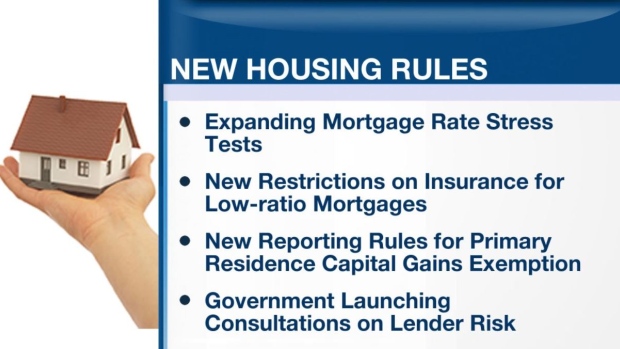New housing measures unveiled by Finance Minister Bill Morneau on Monday that aim to tighten mortgage rules and reduce the flow of foreign cash into the housing market will pose new challenges for both borrowers and lenders in Canada.
Morneau said that all insured mortgages will have to undergo a stress test starting Oct. 17 to determine whether a borrower could still make mortgage payments if faced with higher interest rates or less income. Previously, such stress tests weren't required for fixed-rate mortgages longer than five years.
Andrea Horan, principal and partner at Agilith Capital, said the new stress test rules are important in addressing the growing concern that Canadians are piling on debt.
“What I think is clear is that moral suasion isn’t working,” Horan said in an interview with BNN.
“If you look at Canadian balance sheets, they’re really overstretched, especially if you compare debt to income … Interest rates are so low, so the cost of the debt is affordable relative to income, which is fine until interest rates rise. I think the stress test is an important recognition of that.”
Starting Nov. 30, the federal government will require portfolio-insured mortgages to meet eligibility criteria that previously only applied to highly-leveraged insured mortgages, including a maximum amortization length of 25 years, a maximum purchase price of less than $1 million and minimum credit scores.
More than one-third of insured mortgage borrowers would struggle to meet the standards unveiled by the federal government, according to Genworth MI Canada.
The mortgage insurer added that this would mean some Canadian homebuyers would need to consider buying a lower-priced property or increase the size of their down payment.
The new standards will also predominantly affect first-time homebuyers, Genworth said.
“Furthermore, approximately 50 per cent to 55 per cent of our total portfolio new insurance written would no longer be eligible for mortgage insurance under the new low ratio mortgage insurance requirements,” Genworth said in a statement released Tuesday.

Ottawa also announced that it will launch a public consultation in the coming months to examine the possibility of introducing “lender risk-sharing.” This means banks would have to pay a deductible on mortgage insurance provided by Canada Mortgage and Housing Corp. and its private counterparts, and effectively shoulder more of the risk for mortgage defaults.
Banks would also be forced to retain more capital and raise their funding costs, which would likely be passed on to consumers with higher mortgage rates.
“We’ve had some concerns with regards to the Canadian banks in terms of their growth prospects. And when you’ve got Canadian consumers as leveraged as they are, you do have the risk of credit losses mounting, but maybe more immediately is the difficulty in achieving the same rates of growth,” Horan said.
The federal government's new housing measures also include closing a loophole on an exemption that allows homeowners to avoid paying capital gains tax on the sale of a principal residence. In a move to reduce the flow of foreign cash into markets like Toronto and Vancouver, Ottawa said that exemption will only be available to Canadian residents.











